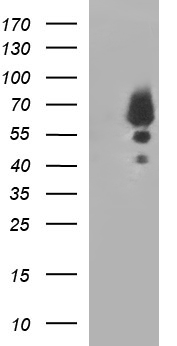Sterol carrier protein 2 (SCP2) Mouse Monoclonal Antibody [Clone ID: OTI1D2]
CAT#: TA507248
SCP2 mouse monoclonal antibody, clone OTI1D2 (formerly 1D2)
Size: 30 ul
Formulation: Carrier Free
Specifications
| Product Data | |
| Clone Name | OTI1D2 |
| Applications | IHC, WB |
| Recommended Dilution | WB 1:4000, IHC 1:150 |
| Reactivities | Human, Mouse, Rat |
| Host | Mouse |
| Isotype | IgG1 |
| Clonality | Monoclonal |
| Immunogen | Full length human recombinant protein of human SCP2(NP_002970) produced in HEK293T cell. |
| Formulation | PBS (PH 7.3) containing 1% BSA, 50% glycerol and 0.02% sodium azide. |
| Concentration | 1 mg/ml |
| Purification | Purified from mouse ascites fluids or tissue culture supernatant by affinity chromatography (protein A/G) |
| Conjugation | Unconjugated |
| Storage | Store at -20°C as received. |
| Stability | Stable for 12 months from date of receipt. |
| Predicted Protein Size | 58.8 kDa |
| Gene Name | sterol carrier protein 2 |
| Database Link | |
| Background | This gene encodes two proteins: sterol carrier protein X (SCPx) and sterol carrier protein 2 (SCP2), as a result of transcription initiation from 2 independently regulated promoters. The transcript initiated from the proximal promoter encodes the longer SCPx protein, and the transcript initiated from the distal promoter encodes the shorter SCP2 protein, with the 2 proteins sharing a common C-terminus. Evidence suggests that the SCPx protein is a peroxisome-associated thiolase that is involved in the oxidation of branched chain fatty acids, while the SCP2 protein is thought to be an intracellular lipid transfer protein. This gene is highly expressed in organs involved in lipid metabolism, and may play a role in Zellweger syndrome, in which cells are deficient in peroxisomes and have impaired bile acid synthesis. Alternative splicing of this gene produces multiple transcript variants, some encoding different isoforms. [provided by RefSeq, Aug 2010] |
| Synonyms | NLTP; NSL-TP; SCP-2; SCP-CHI; SCP-X; SCPX |
| Reference Data | |
| Protein Pathways | Metabolic pathways, PPAR signaling pathway, Primary bile acid biosynthesis |
Documents
| Product Manuals |
| FAQs |
| SDS |
Resources
| Antibody Resources |
{0} Product Review(s)
Be the first one to submit a review






























































































































































































































































 Germany
Germany
 Japan
Japan
 United Kingdom
United Kingdom
 China
China







